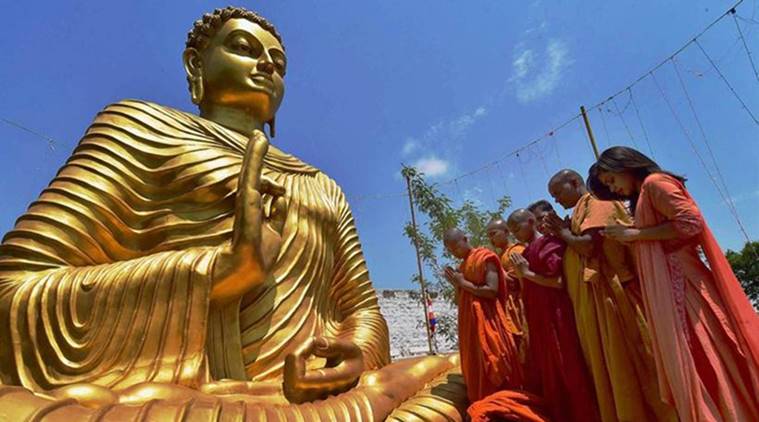- India
- International
The Buddha’s message, for a better world
The current crisis is an apt time to revisit his teachings, which can be a guiding light for a world looking for peace, harmony and sustainability.
 The adoption of the “middle path” by avoiding extreme positions as taught by Buddha leads to realising the truth which further leads to avoiding conflict, reconciliation of different viewpoints, and achieving consensus. (PTI photo)
The adoption of the “middle path” by avoiding extreme positions as taught by Buddha leads to realising the truth which further leads to avoiding conflict, reconciliation of different viewpoints, and achieving consensus. (PTI photo)
“Buddha” denotes one who as attained enlightenment and had a sense of awakening to build a peaceful, harmonious and just society. Today, we are celebrating Buddh Purnima, the day which marks the birth, enlightenment, and Mahaparinirvan of Gautam Buddha, whose teachings have caught the imagination of people across the world over the past 2,500 years. His life and deeds contain such a powerful message, that their resonance transcends cultures, religions and geographies. His messages are becoming increasingly relevant in the present context and a guiding light for chalking out a sustainable approach for the future.
The ongoing COVID pandemic bears testimony to the fact that the complexities of the modern world carry with them more uncertainties and crises. The threats of bioterrorism, climate change, global warming, radicalism, extremism, etc, are shaking the conscience of humanity. Since time immemorial, mankind has built up the capability to control natural resources. The greed and impatient attitude towards utilising these resources have created an imbalance. Reacting to this, nature is more vigorously attacking humanity. The Buddha’s method of introspection and awakening shows the path in these troubling times.
Indian culture and values contain teachings for the inclusive welfare of every creature. This repository of wisdom has given us an advantage and a greater responsibility to act for the betterment of society and the universe at large. The Buddha’s lesson of “Atma Dipo Bhava” — every man can be a light unto himself, a saviour of himself through personal efforts — is apt to alter the individualist approach.
The influence of Buddhist ideas and symbols on our democracy is both profound and visible. In the Lok Sabha, above the chair of the Speaker are inscribed the words, “Dharma Chakra Pravartanay”, which means ‘“setting in motion the wheel of righteousness”. The Preamble of the Constitution enshrines the principals of liberty, equality and fraternity, whose roots can be traced to Buddhist teachings. In his essay, ‘The Ancient Regime— the State of the Aryan Society’ B R Ambedkar writes: “Buddhism was a revolution. It was as great a Revolution as the French Revolution. Though it began as a religious revolution, it became more than a Religious revolution. It became a Social and Political Revolution.”
In a broadcast on the All India Radio on October 3, 1954, he said: “Positively, my social philosophy may be said to be enshrined in three words: Liberty, Equality, and Fraternity. Let no one, however, say that I have borrowed my philosophy from the French Revolution. I have not. My philosophy has roots in religion and not in political science. I have derived them from the teaching of my Master, the Buddha.”

On several occasions, Ambedkar busted the myths regarding the roots of the principals of liberty, equality and fraternity. He emphasised their origins in the ancient Indian teachings of the Buddha. In his essay ‘Buddha or Karl Marx’, he writes: “Society has been aiming to lay a new foundation as summarised by the French Revolution in three words, Fraternity, Liberty, and Equality. The French Revolution was welcomed because of this slogan. It failed to produce equality. We welcome the Russian Revolution because it aims to produce equality. But it cannot be too much emphasized that in producing equality, society cannot afford to sacrifice fraternity or liberty. Equality will be of no value without fraternity or liberty. It seems that the three can coexist only if one follows the way of the Buddha. Communism can give one but not all.”
The Buddhist approach of righteous behaviour, wisdom, compassion and camaraderie, and the reduction of trishna (greed) offers a set of building blocks for a new world order where violence and conflict are minimised and development takes place without degrading the natural resources. The adoption of the “middle path” by avoiding extreme positions as taught by Buddha leads to realising the truth which further leads to avoiding conflict, reconciliation of different viewpoints, and achieving consensus. His eight-fold-path has not only transformed the spiritual landscape worldwide but also encouraged ethical and sustainable social, political, and commercial practices.
All the iconic sights associated with Buddha —. Bodhgaya, Sarnath, Nalanda, Rajgir, Kushinagar, Kapil Vastu, Shravasti, Vaishali and Kaushambi — are rich in tradition and places of spiritual significance. Originating here, the Buddha’s appeal has gone far beyond his 500 million followers worldwide. To connect the increasingly large number of people who identify with the ideals of the Buddha, the Narendra Modi Government has expedited the development of the Buddhist circuit under the Swadesh Darshan scheme which was conceptualised in 1985. These historical places are promoting our shared cultural heritage, tourism, and also the building block for reinforcing India’s soft-power.
It is due to the Buddhist values of compassion and the promotion of peaceful coexistence that the world is looking towards India with hope. His teachings find reflection in the globally-accepted Gandhian ethos. On various international platforms, India has shown that need, not greed is the guiding principle for the judicious use of limited natural resources. India has called for a global people’s movement to bring about behavioural change to reduce humanity’s carbon footprint and achieve the UN’s Sustainable Development Goals with shared responsibility.
While addressing the United Nations General Assembly on September 27, 2019, Prime Minister Narendra Modi said: “We belong to a country, that has given the world, not Yuddh, but Buddh.” He was calling for united action to end the menace of terrorism.
In the ongoing global fight against the corona pandemic, India is leading from the front. India has emerged as the pharmacy of the world by helping out the 123 needy countries by supplying hydroxychloroquine and other medical assistance. Another instance was during the water crisis in the Maldives in December 2014. India was the first nation to assist it through Operation NEER. India immediately rushed bottled drinking water to Malé, utilising Air Force aircraft and Navy ships.
As peace and sustainable development are interlinked, the Buddha’s prism can be the guiding lights to every single stakeholder from local to global institutions and leaders, to work together for promoting dialogue, harmony, and justice based on compassion and wisdom. Buddh Purnima is an apt moment for us to reinforce our commitment to take determined action to relieve ourselves from conflicts, violence, and strengthen the contemporary relevance of Vasudhaiva Kutumbakam.
The writer is Union Minister of State for Parliamentary Affairs, Heavy Industries and Public Enterprises and represents Bikaner in the Lok Sabha.
EXPRESS OPINION
More Explained
Apr 25: Latest News
- 01
- 02
- 03
- 04
- 05











































